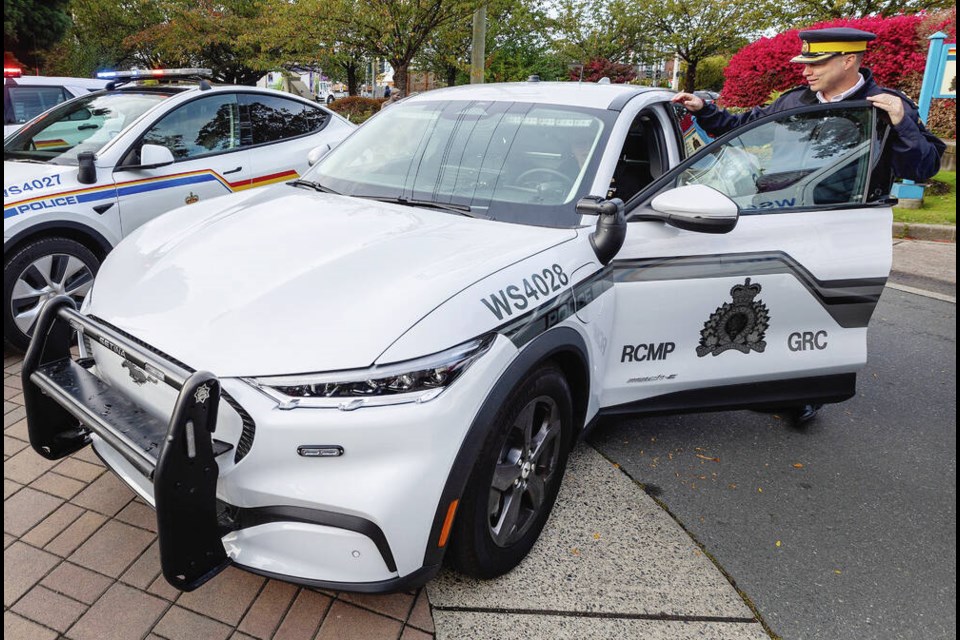Two more electric patrol vehicles were unveiled Wednesday by West Shore RCMP, which continues to be a testing ground for the Mounties’ goal to convert its fleet of thousands of vehicles across the country to zero- emissions.
West Shore’s front-line officers have been piloting a Tesla Model Y since early 2023, and this week are getting behind the wheels of a Mustang Mach-E and a Ford F-150 Lightning pickup truck.
Two years ago, the RCMP and Natural Resources Canada started a four-year working arrangement to evaluate the feasibility of zero-emission vehicles for policing across Canada. It’s a hefty mandate that involves converting half its light-duty vehicle fleet to zero-emission by 2030, with a full transition by 2050.
The RCMP has just over 10,000 police vehicles across Canada, with a turnover of about 1,500 per year. The force operates in eight provinces and three territories, as well as 150 municipalities, including many remote and vast territories with limited charging infrastructure and power grids, so the timelines to EV transition are flexible.
West Shore was selected for a pilot project largely because of the warmer climate and four Level 2 charging stations already in place, said Superintendent Todd Preston, officer in charge of the detachment.
“It’s not a one-size-fits-all for the RCMP,” said Preston. “Here on the West Coast where the weather’s more tolerable than the Prairies, these vehicles are obviously a better fit for trials.”
He said Island and Lower Mainland RCMP detachments will likely follow suit.
The RCMP only has one other electric vehicle in its national fleet right now — a Tesla assigned to the prime minister’s protective detail, said Preston. West Shore’s trio of EVs are the only electric vehicles in RCMP front-line policing.
So far, officer responses to the Tesla trial have been favourable in terms of performance and use, including battery life, West Shore RCMP said.
Preston said officers often return to the detachment several times during a shift to write reports and perform other duties, so they will plug in to ensure the vehicles are always charged and ready to go.
“We haven’t had the challenges that some people anticipated in terms of running out of power mid-shift,” he said.
Asked about the Mustang EV’s performance, particularly its speed compared to its gas-powered counterpart, Preston called the EV version “impressive.”
“I’ve taken it out on the track in Ottawa and it has undeniable pickup and torque,” said Preston. “I think you would be hard-pressed to find a vehicle to keep up with these. We don’t engage in too many police chases anymore, but I imagine it would be tough to outrun us.”
The Mustang will be used in traffic patrols. The vehicle does not have a light bar on its roof and its RCMP and police decals are in muted black and grey as part of a new “covert” look, said Cpl. Nancy Saggar.
“We’ve noted from other agencies with similar decals it can increase how many impaired drivers that we can catch,” she said. “It’s not as heavily noticeable as a vehicle that’s fully marked. It allows us to be a little more covert, allowing us to do road checks and stops without being fully obvious and catching people who are not obeying the law.”
Last year, when Preston unveiled the Tesla Y, he said the average general duty West Shore police vehicle cost about $11,100 in fuel and maintenance fees, based on 2020 data. Since then, costs have gone up due to higher fuel prices and inflation.
Preston said the cost of charging and maintaining an electric vehicle is expected to be significantly lower than the cost of maintaining a gas-powered vehicle. The positive environmental impact of replacing internal combustion engine vehicles with electric vehicles is also significant, he said, since a single gas-powered vehicle emits about 2.3 kilograms of CO2 per litre of gas.
The West Shore RCMP are also testing a new roof-top light bar on one of their Ford Explorers, another first for RCMP in Canada.
The Federal Signal Valor light bar is triangular, has additional light patterns and is noticeably brighter. The triangular shape is designed to be more visible to drivers and pedestrians who approach a police vehicle from the side. It’s intended to reduce collisions as police vehicles go through intersections on emergency calls.
The Valor light bars have been used by the Vancouver Police Department for several years and are also used by police departments in Los Angeles, Chicago, Florida and New York.
“As we’re going through intersections, we want people to see us, and so the more lighting the better,” said Preston.
>>> To comment on this article, write a letter to the editor: [email protected]



